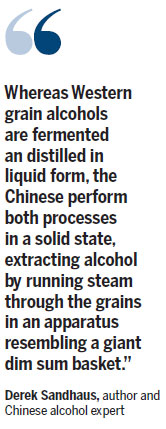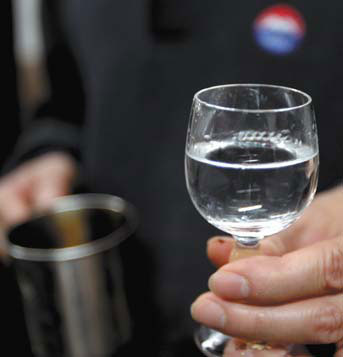A toast to closer bonds
China's national liquor Moutai is looking to be a name on more people's lips, Matt Prichard reports.
A visit to Maotai town in Guizhou province, the home of China's iconic Moutai baijiu, or white spirit, took me back to a visit I made with my father to the distillery of Jack Daniel's Tennessee whiskey, a famous brand produced in the southeastern United States.
This was a number of years before my father died in 2004, and I remember it well as a golden moment in a sometimes contentious relationship.
On this trip, it was just dad and me. He was an occasional social drinker, and his sense of moderation in personal habits, curiosity about the world and passion in his beliefs were things that helped mold me even when I wasn't aware of it.
I am convinced that his influence is one of the reasons I have ventured abroad and now found myself in Southwest China, in a region of tall, sometimes mist-shrouded mountains near the province's northwestern border, at another famous distillery alongside the waters of the Chishui River, or Red River.
While the town and the liquor share the same name in Chinese, Moutai liquor uses an older form of transliteration into the Latin alphabet, while the town's name, Maotai, uses the modern, official pinyin system.
Both the Chinese and American liquors and the distilleries that make them share some qualities. Both draw from the water and the land that produce them, and both involve tradition and adherence to techniques that provide a consistent taste expected by customers around the world.
"This method of making liquor has been preserved over hundreds of years. It's very traditional," said Wang Zhifa, a spokesman for the company, Kweichow Moutai Co Ltd.
The fiery taste of Moutai, likened to soy sauce, to me also has hints of earthiness and licorice.
The liquor is made from sorghum and wheat and is intense at the beginning and smoother at the end.
The company's flagship Moutai Flying Fairy liquor, which is 53 percent alcohol, is usually served in small shot glasses that hold only a few thimblefuls of liquor. That's good, given that banquets and business dinners can involve many individual and group toasts of ganbei, or "dry cup".
To create that taste takes years of fermentation, distilling, blending and aging. While virtually all of Maotai town carries the sauce-like fragrance of the liquor, walking into one of the long buildings where sorghum is mixed with hot water and fermented is to be hit with a very strong, soy sauce-like scent.
The grain is cooked a total of seven times, and in between, the steaming sorghum is raked out to cool in a very traditional process by barefoot men wielding wood and metal shovels, according to Zhou Xiang You, the workshop director. The cooled sorghum is raked up into a large pile and the process starts again.
There were three piles of grain in front of us, each a different tone of brown.
"The sole purpose of heating the sorghum over and over again is to produce the fragrance," Zhou said. He said attempts to mechanize the process have failed in terms of quality.
The sorghum is then transferred into stone-lined pits dug alongside the floor and covered with a tarpaulin and clay.
The company said its open and closed fermentation techniques are part of the reason for the liquor's fragrance, as are the variety of microorganisms that the process employs.
As Derek Sandhaus explained in an article for the online magazine Punch last year: "Whereas Western grain alcohols are fermented and distilled in liquid form, the Chinese perform both processes in a solid state, extracting alcohol by running steam through the grains in an apparatus resembling a giant dim sum basket.
The flavors and aromas are unlike those found in any liquor elsewhere."
Batches of liquor are then aged for at least three years, then liquors from different batches and different years are blended under the supervision of professional tasters. After an average of five years, Moutai can be bottled and sold.
While touring Moutai's huge production facilities, and tasting the liquor, I was taken back time and time again to my Tennessee trip with dad. Pulling up at the Jack Daniel Whiskey Distillery in the green valley carved by the East Fork Mulberry Creek in southcentral Tennessee seemed like a natural thing: Many of my family's roots were planted in the South in the 19th century, and Tennessee whiskeys are a fine Southern tradition in the United States.
Jasper Newton "Jack" Daniel was, in fact, a real person, who ran away from home as a boy after his father died in the US Civil War. He was taken in by a lay preacher and moonshiner and later established the distillery that took his name.
We had taken the highway to Lynchburg, home to Jack Daniel's and about 6,500 people, and toured the distillery where mostly corn, a little rye and malted barley is distilled in copper stills before the liquid is mellowed by dripping through three meters of sugar maple charcoal.
The process involving charcoal filtration is what differentiates a Tennessee whiskey from regular bourbon.
We walked through the warehouse where the whiskey is "matured" in hundreds of new, white oak barrels with their insides charred.
Like at Maotai, the air was permeated with the scent of the liquor, but in this case we were surrounded by an oaky cloud of rich, almost intoxicating whiskeyness.
Then we stopped by the spring where water was originally drawn for the liquor. Much as Moutai credits its Chishui River water, Jack Daniel's says its "pure, ironfree cave spring water" is still crucial for its whiskey.
It was a coming-of-age experience for me and a bonding experience for father and son.
It's easy in many bars in China to order a "Jack and Coke", a drink made with Jack Daniel's and Coca-Cola. Jack Daniel's is, after all, the top-selling US whiskey. It's harder to find Moutai, or any baijiu, in the West. But that may be changing.
Yuan Renguo, chairman of Kweichow Moutai, said the company's flagship liquor "should be shared with all the people of the world."
As part of the company's move away from relying on consumption at official banquets - in the wake of the government's austerity program - Moutai is targeting domestic business and individual customers and the export market.
While Yuan said exports represented only 1.2 billion yuan ($195 million) in revenue out of the company's 40.8 billion yuan in total revenue last year, it's a growth market.
Part of the plan is to open branch offices in places like France, North America, Russia, South Korea and Japan.
The company wants to go beyond export purchases by Chinese political emigrants and Chinese doing business abroad. "If the culture of China can meet comfortably and converge with Western culture, as it has, I think Moutai can. It's time for it to arrive," Yuan said.
I can toast to that.
Contact the writer at matthew prichard@chinadaily.com.cn

|
A view of Maotai town in Guizhou province. Wang Zhuangfei / China Daily |
|
Moutai provides a consistent taste expected by customers around the world. |
|
Moutai factory wastes undergo advanced treatment. Photos by Zhang Wei / China Daily |
(China Daily 05/05/2015 page7)

















